When you’re feeling under the weather, the right foods can be your best ally. This guide dives into the best foods to eat when you are sick, focusing on those that comfort, heal, and nourish your body back to health. From the soothing warmth of chicken soup to the immune-boosting power of garlic, each food is selected for its proven benefits during illness. Understanding what to eat can help alleviate symptoms, boost your immune system, and shorten your recovery time. Let’s explore these culinary healers and how they can help you bounce back stronger.
Contents
Chicken Soup
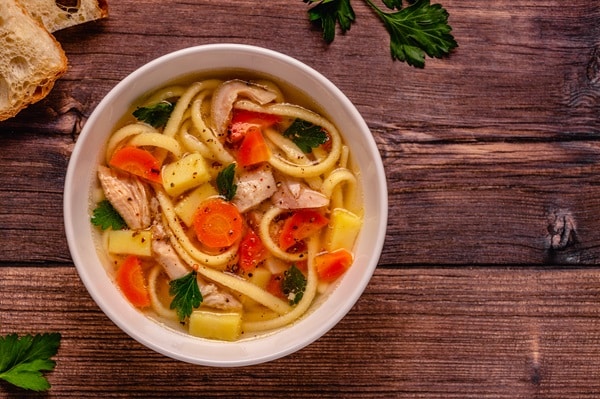
Chicken soup isn’t just a comfort food; it’s a medicinal marvel in a bowl. As you sip the warm broth, it acts as a natural decongestant, easing cold symptoms. The steam helps open nasal passages, while the rich blend of nutrients from the chicken and vegetables fortifies your body. This soup provides a gentle, easily digestible way to stay hydrated and nourished. Moreover, the collagen and minerals from the bones, if homemade, offer additional healing benefits, making chicken soup a top choice for anyone feeling under the weather.
Beyond its physical benefits, chicken soup embodies a sense of care and comfort. Each spoonful offers a soothing effect, reducing inflammation and accelerating healing. The combination of tender chicken, soft vegetables, and warm broth provides a balanced meal that’s gentle on the stomach. It’s versatile, too; you can add rice, noodles, or more vegetables to enhance its nutritional profile. Whether you’re battling a cold or flu, chicken soup is a time-honored remedy that supports recovery from the inside out.
Ginger
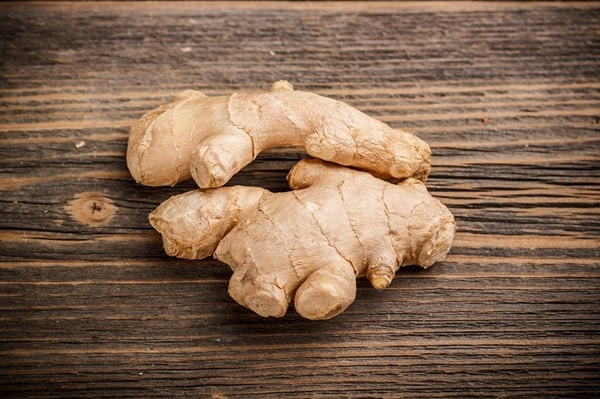
Ginger is a potent ally against various symptoms of sickness, especially nausea and digestive discomfort. Its active components, like gingerol, have anti-inflammatory and antioxidant effects, which help soothe an upset stomach. Consuming ginger in small amounts can significantly reduce feelings of nausea, making it a go-to remedy for everything from the flu to morning sickness. It’s also known to aid digestion, helping to calm your stomach and speed up the recovery process. By incorporating ginger into your diet, you’re not only easing symptoms but also enhancing your overall immune response.
Integrating ginger into your meals is both easy and beneficial. You can steep sliced ginger in hot water to make a soothing tea, add grated ginger to soups and broths, or include it in stir-fries for a healthy kick. Its spicy, warming flavor not only perks up your meals but also encourages a healthy appetite, which can wane when you’re sick. Regular consumption of ginger can contribute to a healthier digestive system, making it a valuable food for both sickness and health maintenance.
Garlic
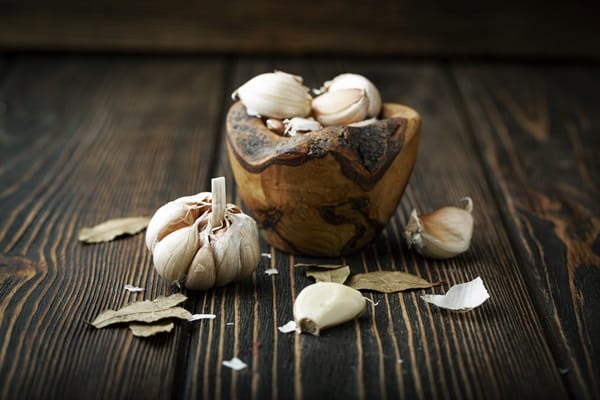
Garlic is renowned for its immune-boosting properties thanks to its high concentration of sulfur-containing compounds, such as allicin. When you’re sick, consuming garlic can help combat illness by enhancing your immune cells’ efficiency. It has antibacterial and antiviral properties, making it a formidable opponent against infections. Adding garlic to your diet can help reduce the severity of cold symptoms and even shorten the duration of your illness. Its potent flavors and health benefits make it an essential ingredient in the kitchen for both culinary and medicinal purposes.
To maximize the benefits of garlic, it’s best consumed raw or lightly cooked, as high heat can diminish its medicinal properties. Incorporating crushed or chopped garlic into dressings, sauces, or as a garnish can amplify the flavor and health benefits of your meals. For those concerned about the strong taste, roasting garlic can mellow its flavor while retaining its healthful qualities. Regularly including garlic in your diet not only helps when you’re sick but also strengthens your immune system, preparing your body to ward off future illnesses.
Bananas

Bananas are a gentle, nutritious fruit ideal for anyone feeling unwell. Their soft texture and natural sweetness provide an energy boost without irritating the stomach. Rich in potassium, bananas help replenish electrolytes that may be lost due to fever or vomiting. They are also a good source of vitamin B6, vitamin C, and fiber, which are crucial for maintaining health and aiding recovery. As part of the BRAT diet (bananas, rice, applesauce, toast) often recommended for gastrointestinal distress, bananas are a safe and soothing choice.
Eating bananas can be a comforting and healing experience during sickness. They’re easy to chew and swallow, making them suitable for a sore throat or weak digestion. You can enjoy bananas plain, mashed into a smoothie, or sliced over oatmeal or yogurt to enhance their nutritional value. Their natural sugars provide a quick source of energy, helping you feel better and more active. Whether you’re dealing with a stomach bug or recovering from a cold, bananas offer a delicious way to support your recovery and regain strength.
Oatmeal
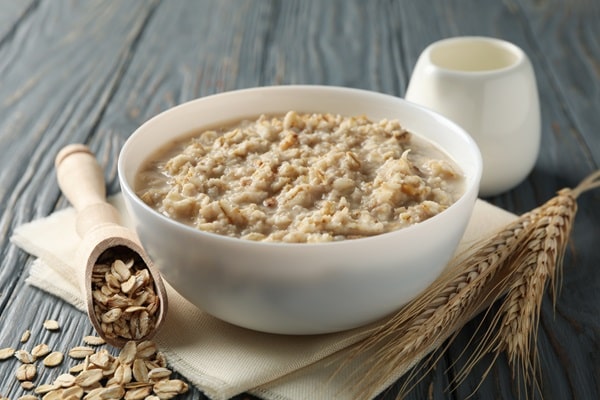
Oatmeal is a comforting whole grain that’s perfect for those seeking a mild, nutritious option while sick. Its soluble fiber aids in digestion, helping to settle upset stomachs and maintain regularity without harshness. Oatmeal acts as a blank canvas, easily flavored with honey, fruits, or a sprinkle of cinnamon to enhance its taste while keeping it gentle on the digestive system. It’s also packed with essential nutrients like magnesium, phosphorus, and zinc, which are vital for recovery and overall health. The warmth and soft texture make it particularly soothing for those with sore throats or difficulty swallowing.
Incorporating oatmeal into your sick day diet can provide sustained energy due to its low glycemic index, keeping blood sugar levels stable. It’s hydrating, especially when made with milk or water, contributing to your daily fluid intake. For an added nutritional boost, top it with banana slices or a dollop of yogurt. This versatile grain can be prepared in various ways, ensuring it never becomes monotonous. Whether you prefer it sweet or savory, oatmeal is a reliable, comforting option that supports healing and nourishment.
Honey
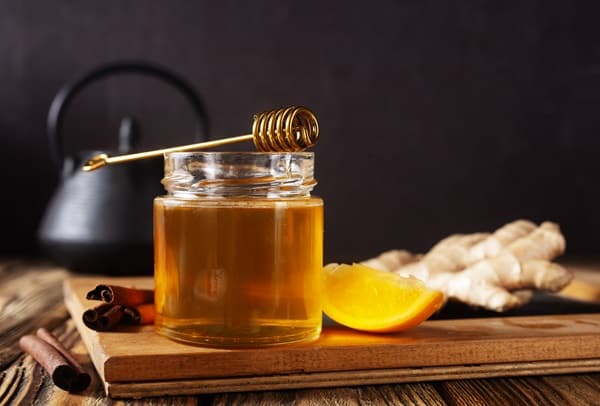
Honey is more than just a natural sweetener; it’s a treasure trove of antioxidants and antibacterial properties, making it an excellent food for soothing sore throats and coughs. Its thick consistency coats the throat, providing a protective layer that can calm irritation and coughing. The antioxidants in honey help fight off viruses and bacteria, supporting your immune system during times of illness. It’s also known to have wound-healing properties, which can be beneficial for those recovering from infections or surgeries.
Using honey as a natural remedy involves more than just adding a spoonful to your tea. It can be drizzled over oatmeal or yogurt, mixed into smoothies, or even eaten straight from the spoon for a quick boost of energy and antioxidants. However, it’s essential to use it in moderation due to its high sugar content. Opting for raw, unprocessed honey can provide the most benefits, as it retains more of its natural enzymes and antioxidants. Whether you’re using it to sweeten a drink or as a medicinal remedy, honey is a versatile and powerful food for recovery.
Sweet Potatoes
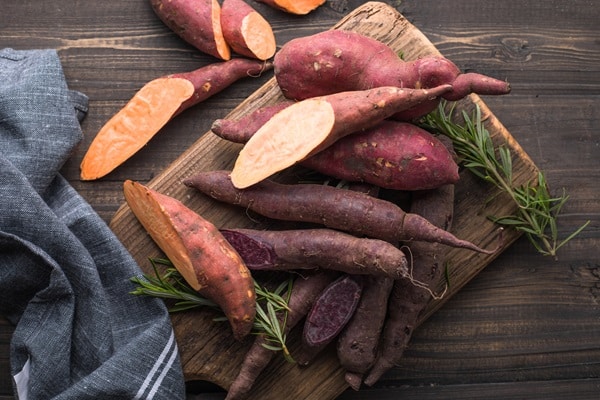
Sweet potatoes are a fantastic source of vitamins and minerals, particularly vitamin A, which is crucial for immune function and overall health. Their natural sweetness and creamy texture make them an appealing choice when your appetite is diminished. Rich in dietary fiber, sweet potatoes promote a healthy digestive system, which is often compromised when you’re sick. They’re also a good source of complex carbohydrates, providing long-lasting energy and helping you feel full and satisfied.
Preparing sweet potatoes is simple and versatile. They can be baked, boiled, or mashed, making them easy to digest and gentle on the stomach. For an extra boost of nutrients, pair them with a dollop of Greek yogurt or a sprinkle of nuts. Their natural sweetness pairs well with a variety of flavors, allowing for numerous preparation methods. Whether you’re seeking comfort food or a nutrient-dense meal, sweet potatoes are an excellent choice to include in your diet while recovering from an illness.
Embrace Healing Through Nutrition
As you navigate the path to recovery, remember that the foods you choose can significantly influence your healing journey. Embrace these nourishing options to alleviate symptoms, boost your immune system, and energize your body. Let each meal be a step toward better health, and don’t hesitate to incorporate these foods into your regular diet for ongoing wellness. Take action today by selecting one or more of these healing foods and notice the comforting difference they make in your recovery process.


